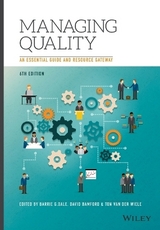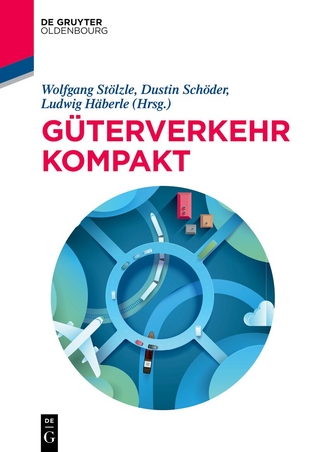
Managing Quality
Wiley-Blackwell (an imprint of John Wiley & Sons Ltd) (Verlag)
978-1-4051-4279-3 (ISBN)
- Titel ist leider vergriffen;
keine Neuauflage - Artikel merken
Barrie G. Dale is Professor of Quality Management at Manchester Business School. Founder of the International Journal of Quality and Reliability Management, he has been its co-editor for over 23 years. He has authored several other books including, The Road to Quality (1993), Quality Improvement through Standards (2nd edition, 1994), Managing Quality and Human Resources (2nd edition, 1997), Working in Partnership (1998), Managing Business Improvement and Quality (1998), Total Quality Management Blueprint (1999) and Quality Costing (3rd edition, 1999). Ton van der Wiele is Associate Professor of Quality Management and Performance Improvement at RSM Erasmus University, Rotterdam. He obtained his PhD degree from Erasmus University in 1998, and his main research interests are in Quality Management, Performance Improvement, Management Consultancy and E-business. Co-editor of the International Journal of Quality and Reliability Management and European editor of Managing Service Quality, van der Wiele has worked in the field for more than twenty years. He is also coordinator of the global E-Business Research Network. Jos van Iwaarden is Assistant Professor of Quality Management and Performance Improvement at RSM Erasmus University, Rotterdam. He obtained his PhD degree from Erasmus University in 2006, and his main research interests are in Quality Management issues in the automotive industry. He has published over 15 papers in international journals and presented his research at the Academy of Management conference, IEEE engineering management conference, and the Australian and New Zealand Academy of Management conference. He is associate editor of the International Journal of Quality and Reliability Management.
List of figures. List of tables and boxes. List of standards. List of abbreviations. List of contributors. Preface. Part I: The Development, Introduction and Sustaining of Total Quality Management (TQM):. 1. TQM: An Overview: B. G. Dale (University of Manchester), A. van der Wiele (Erasmus University) and J. D. van Iwaarden (Erasmus University). Introduction. What is Quality?. Why is Quality Important?. The Evolution of Quality Management. The Key Elements of TQM. Summary: Developing TQM. 2. The Role of Management in TQM: B. G. Dale (University of Manchester), A. van der Wiele (Erasmus University) and J. D. van Iwaarden (Erasmus University). Introduction. The Need for Senior Managers to Get Involved in TQM. What Senior Managers Need to Know about TQM. What Senior Managers Need to Do about TQM. The Role of Middle Managers. The Role of First-Line Managers. Summary. 3. The Received Wisdom on TQM: B. G. Dale (University of Manchester), A. van der Wiele (Erasmus University) and J. D. van Iwaarden (Erasmus University). Introduction. Crosby. Deming. Feigenbaum. Juran. Are the Approaches of these Gurus Different?. Imai. Ishikawa. Shingo. Taguchi. Japanese-Style Total Quality. Summary. 4. The Introduction of TQM: B. G. Dale (University of Manchester), A. van der Wiele (Erasmus University) and J. D. van Iwaarden (Erasmus University). Introduction. Change and Continuous Improvement. Forces for Change. How Do Companies Get Started?. Approaches to TQM. Summary. 5. A Framework for the Introduction of TQM: B. G. Dale (University of Manchester), A. van der Wiele (Erasmus University) and J. D. van Iwaarden (Erasmus University). Introduction. Organizing. Systems and Techniques. Measurement and Feedback. Changing the Culture. Use of the Framework. Summary and Outcomes. 6. Levels of TQM Adoption: B. G. Dale (University of Manchester) and D. M. Lascelles (David Lascelles Associates). Introduction. Level 1 - Uncommitted. Level 2 - Drifters. Level 3 - Tool-Pushers. Level 4 - Improvers. Level 5 - Award-Winners. Level 6 - World-Class. Summary. 7. Sustaining TQM: B. G. Dale (University of Manchester). Introduction. TQM Sustaining Audit Tool: Development and Methodology. Category 1 - Internal/External Environment. Category 2 - Management Style. Category 3 - Policies. Category 4 - Organization Structure. Category 5 - Process of Change. Summary. Part II: The Business Context of TQM:. 8. Policy Deployment: R. G. Lee (Royal Air Force) and B. G. Dale (University of Manchester. Introduction. Definitions: Policy Deployment. What is Policy Deployment?. What Policy Deployment is Not. The Policy Deployment Process. A Check-Reflect-Improve-Scrutinize-Pass (CRISP) Approach to Policy Deployment. Summary. 9. Quality Costing: B. G. Dale (University of Manchester). Introduction. Definition and Categorization of Quality Costs. Collecting Quality Costs. Some Cost Aspects of Manufacturing Industry. Reporting Quality Costs. Uses of Quality Costs. Summary. 10. Managing People: A. Wilkinson (University of Loughborough) and A. Brown (Edith Cowan University). Introduction. QM: The HR Concerns. The Two Sides of QM. QM and the Management of People. HR Policies and Practices. Employee Involvement. Organizational Culture. Training and Education. Selection. Appraisal. Pay. Employee Well-Being. Industrial Relations. Employment Security. Integration. Summary. 11. Managing Service Quality: B. R. Lewis (University of Manchester). Introduction. The Service Environment. Defining Service Quality. The Role of Personnel in Service Delivery. Service Delivery. Summary. 12. Supplier Development: B. G. Dale (University of Manchester) and B. Burnes (University of Manchester). Introduction. Long-Term Issues of Partnership. Barriers to Developing Partnerships. Conditions of Partnership. The Issues to be Considered in Partnership. The Process of Partnership. Potential Difficulties of Operating Partnerships. Summary. Part III: Quality Management Systems, Tools and Techniques:. 13. Quality Management Systems: B. G. Dale (University of Manchester). Introduction. What is Quality Assurance?. What is a Quality Management System?. The Development of Quality Management System Standards. The ISO 9000 Series of Standards: An Overview. Implementation Guidelines for ISO 9001. Quality Management System Assessment and Registration. ISO 9000 Series Registration: A Model for Small Companies. Benefits and Limitations of the ISO 9000 Series of Standards. Summary. 14. Integrated Management Systems: G. Wilkinson (British Telecom) and B. G. Dale (University of Manchester). Introduction. The Case for Integration and Some of the Problems. The ISO 9001/ISO 14001 Matrix. Interlinked Systems. The EFQM Model. A Comparative Analysis of the Current Integration Models. The Key Integration Issues. An Integrated Management Systems Model. Summary. 15. Tools and Techniques: An Overview: B. G. Dale (University of Manchester). Introduction. Selecting Tools and Techniques. Difficulties and Issues Relating to the Use of Tools and Techniques. Problem-Solving Methodology. Checklists. Flowcharts. Checksheets. Tally Charts and Histograms. Graphs. Pareto Analysis. Cause-and-Effect Diagrams. Brainstorming. Scatter Diagrams and Regression Analysis. The Seven Management Tools. Housekeeping. Departmental Purpose Analysis. Mistake-Proofing. Total Productive Maintenance. Summary. 16. Quality Function Deployment: I. Ferguson (Ferguson Associates) and B. G. Dale (University of Manchester). Introduction. Understanding Customer Needs. The QFD Road: The Main Steps. Deploying Customer Needs into Product and Process Definition. The Benefits of the Four-Stage Approach. QFD and the Service Sector. Difficulties Associated with QFD. Implementation of QFD. Summary. 17. Design of Experiments: I. Ferguson (Ferguson Associates) and B. G. Dale (University of Manchester). Introduction. Methods of Experimentation. Taguchi: An Overview of his Approach. Achieving Robust Design: An Example from Tile Manufacturing. Steps in Experimental Design. Summary. 18. Failure Mode and Effects Analysis: J. R. Aldridge (Siemens Standard Drives) and B. G. Dale (University of Manchester). Introduction. What is Failure Mode and Effects Analysis?. Development of a Design FMEA. Development of a Process FMEA. Analysis of Failure Data. Recommended Actions for Design and Process FMEA. Background to the Use of FMEA at Allied Signal Automotive. Developing the Use of FMEA at Allied Signal Automotive. Summary. 19. Statistical Process Control: B. G. Dale (University of Manchester) and P. Shaw (formerly of UMIST). Introduction. What is Statistical Process Control?. The Development of Statistical Process Control. Some Basic Statistics: Averages and Measures of Dispersion. Variation and Process Improvement. Variable and Attribute Data. Data-Collection. Construction of Control Charts Using Variables Data. Interpreting a Variables Control Chart. Construction of Control Charts Using Attribute Data. Construction and Interpretation of Control Charts: Dos and Don'ts. Process Capability. Implementation of SPC. Difficulties Experienced in Introducing and Applying SPC. Summary. 20. Six Sigma: A. van der Wiele (Erasmus University), J. D. van Iwaarden (Erasmus University), B. G. Dale (University of Manchester) and A. R. T. Williams (Erasmus University). Introduction. What does Six Sigma Mean?. Six Sigma Pre-Requisites. Six Sigma Core Elements. Success of Six Sigma. Summary. 21. Benchmarking: R. Love (Alexanders Ltd) and B. G. Dale (University of Manchester). Introduction. Company Background. Why Benchmarking?. Success Factors. Difficulties and Pitfalls. Key Lessons. Summary. 22. Business Process Re-engineering: J. Macdonald (John Macdonald Associates) and B. G. Dale (University of Manchester). Introduction. Approaches Used in BPR. The Principles of BPR. Risks and Benefits of BPR. Implementation of BPR. BPR Methodology. Summary. 23. Teams and Teamwork: B. G. Dale (University of Manchester), A. van der Wiele (Erasmus University) and J. D. van Iwaarden (Erasmus University). Introduction. The Role of Teams in Continuous Improvement. Types of Teams. Differences between Teams. Commonalities between Teams. Evaluation of Teams. Team Competition. Guidelines for Developing Effective Teams. Summary. 24. Self-Assessment, Models and Quality Awards: B. G. Dale (University of Manchester), A. van der Wiele (Erasmus University) and J. D. van Iwaarden (Erasmus University). Introduction. Quality, TQM and Excellence. Award Models. The Self-Assessment Process. Success Factors for Self-Assessment. Difficulties with Self-Assessment. Summary. 25. Improvement Approaches: A. van der Wiele (Erasmus University), J. D. van Iwaarden (Erasmus University), B. G. Dale (University of Manchester) and A. R. T. Williams (Erasmus University). Introduction. Five Modern Improvement Approaches. Approaches: Systematically Defined. Approach 1: Total Quality Management (TQM). Approach 2: Total Productive Maintenance (TPM). Approach 3: Lean Manufacturing. Approach 4: Business Process Reengineering (BPR). Approach 5: Six Sigma. Analysis of the Approaches. Managerial Implications: Which Improvement Approach is Best?. Summary. Part IV: TQM through Continuous Improvement:. 26. Quality Management: New Challenges: J. D. van Iwaarden (Erasmus University), A. van der Wiele (Erasmus University), B. G. Dale (University of Manchester) and A. R. T. Williams (Erasmus University). Introduction. Developments. 'Old' Quality Management. 'New' Quality Management. Summary. 27. Managing Quality: Epilogue: B. G. Dale (University of Manchester), A. van der Wiele (Erasmus University) and J. D. van Iwaarden (Erasmus University). Introduction. The Importance of Quality. TQM: A Continuous Process. Measuring Progress towards TQM. TQM Issues which Need to be Considered in the Future. Summary. Index
| Erscheint lt. Verlag | 8.11.2007 |
|---|---|
| Zusatzinfo | Illustrations |
| Verlagsort | Chichester |
| Sprache | englisch |
| Maße | 171 x 246 mm |
| Gewicht | 882 g |
| Themenwelt | Wirtschaft ► Betriebswirtschaft / Management ► Logistik / Produktion |
| ISBN-10 | 1-4051-4279-0 / 1405142790 |
| ISBN-13 | 978-1-4051-4279-3 / 9781405142793 |
| Zustand | Neuware |
| Haben Sie eine Frage zum Produkt? |
aus dem Bereich



